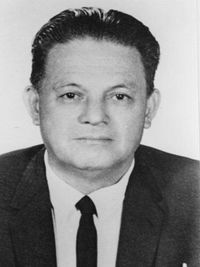
Carlos Luis Fallas Sibaja (Alajuela, January 21, 1909 – San José, May 7, 1966) was a Costa Rican communist writer and leader, known as Calufa.
On November 14, 1977, the Legislative Assembly named him Benemérito de la Patria by agreement No. 1793.
Biography of this illustrious Costa Rican literature.
He was born in the province of Alajuela, on January 21, 1909. Of very humble origin. The illegitimate son of Roberto Cantillano Vindas, director of Costa Rican military gangs, and Adelina Fallas Sibaja. When he was about 6 years old, his mother (of peasant extraction) married Rubén Barrantes, “a very poor shoemaker,” and had 6 daughters with him, Emma, Lilly, Betty, Arabella, Esmeralda, and Odalía.
Student and work trajectory
He attended the second year of secondary education. At the age of 16, he went to work on the plantations of the United Fruit Company, in the Costa Rican Atlantic zone. He dedicates himself to other tasks as an apprentice in the workshops on a railroad and moves to the province of Limón, where he worked as a loader on the docks and later worked in the banana companies as a laborer, a bricklayer’s assistant, a dynamiter, and a tractor driver, due to into exile, where he intervened in the great banana strike of 1934 against the United States company United Fruit Company, which mobilized more than 15,000 workers. This motivated him to be imprisoned again; he went on a hunger strike and was finally released.
Later, he learned the trade of shoemaker, work that allowed him to get involved with the proletarian sector, and join the Communist Party. He was the Municipal Councilor of San José and deputy, as well as improvised Military Chief of the worker’s battalions during the Civil War of 1948.
Political career

At the age of 22, motivated by the revolutionary and anti-imperialist ideals that were beginning to emerge in the Costa Rican proletariat, he joined the ranks of the nascent labor movement, in three months he learned the trade of shoemaker to live. He actively participated in the political and social life of the country: he was a member of the first Alajuelense unions and a leader of strikes that landed him in jail on several occasions; He was one of the most visible leaders of the Costa Rican Communist Party.
In 1933 he was seriously injured in a bloody clash between workers and the police. That same year, after a speech described as subversive by the authorities. He was elected municipal councilor in 1942 and deputy in the National Congress in 1944. He participated as military commander of communist battalions in the civil war of 1948 and later went to jail once more, on which occasion he was on the point of being shot.
Calufa traveled to Moscow in 1965, along with his then-wife, Zahyra Agüero. As Joaquín Gutiérrez once stated, Fallas had developed a small lump in his groin before making the trip, so he visited a doctor who offered to operate the next day. However, he refused precisely because of the trip and said that if he had to operate, he would do it there.
Death
He died at the age of 57, a victim of kidney cancer, on May 7, 1966, in San José. His remains lie in the Obrero Cemetery along with 12 other bodies, in a borrowed vault and without an identification tombstone. Eleven years after his death, on November 14, 1977, the Legislative Assembly named him Benemérito de la Patria by agreement No. 1793.

